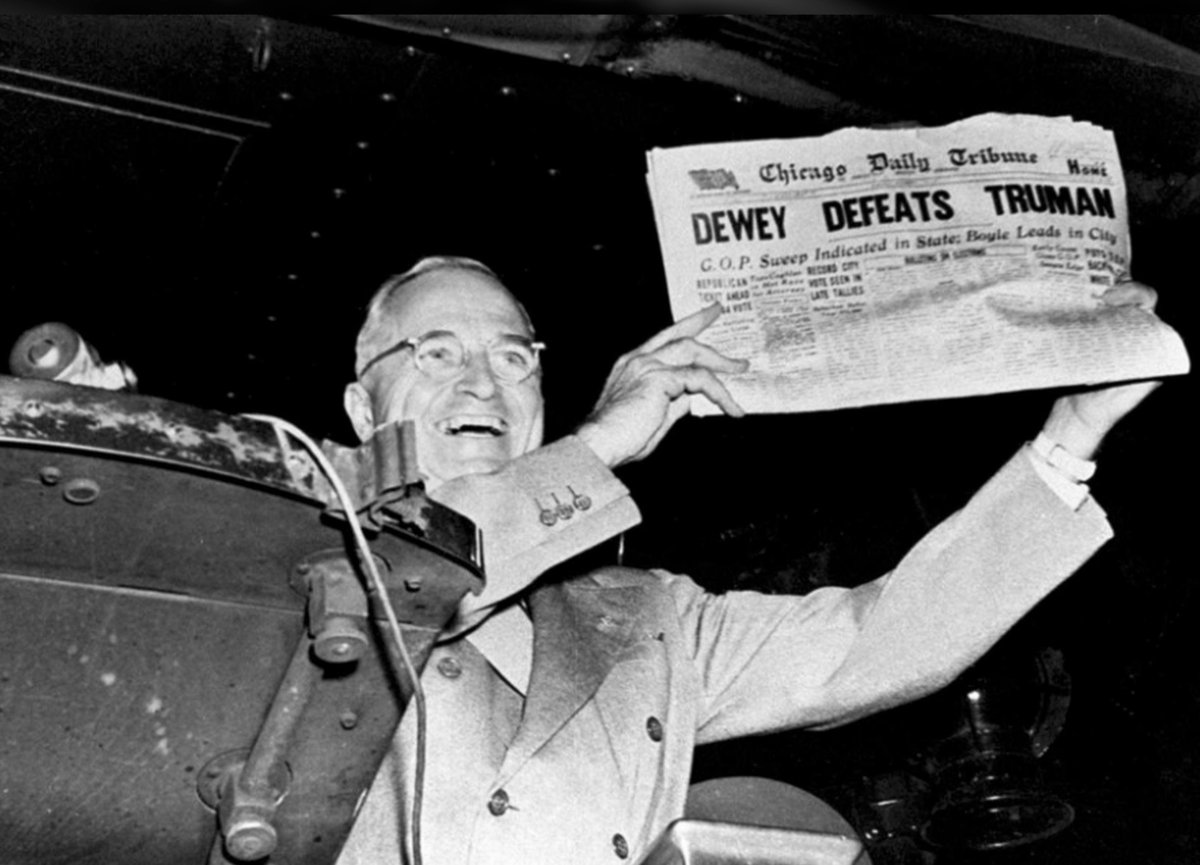American History
Related: About this forumOn this day, November 3, 1948, Dewey defeated Truman.
Link to tweet

The election was on November 2. The paper was an early edition of the November 3 "Chicago Daily Tribune." The picture was taken on November 4. Per Wikipedia's metadata for the picture:

President Truman holding an early edition of the November 3, 1948 Chicago Daily Tribune showing an erroneous presidential election headline
"Dewey Defeats Truman" was an incorrect banner headline on the front page of the Chicago Daily Tribune (later Chicago Tribune) on November 3, 1948, the day after incumbent United States president Harry S. Truman won an upset victory over his opponent, Governor Thomas E. Dewey of New York, in the 1948 presidential election. It was famously held up by Truman at a stop at St. Louis Union Station following his successful election, smiling triumphantly at the error.
Background
The Chicago Daily Tribune, which had once referred to Democratic candidate Truman as a "nincompoop", was a famously Republican-leaning paper. In a retrospective article some 60 years later about the newspaper's most famous and embarrassing headline, the Tribune wrote that Truman "had as low an opinion of the Tribune as it did of him".
For about a year prior to the 1948 election, the printers who operated the linotype machines at the Chicago Tribune and other Chicago papers had been on strike, in protest of the Taft–Hartley Act. Around the same time, the Tribune had switched to a method by which copy for the paper was composed on typewriters, photographed, and then engraved onto the printing plates. This process required the paper to go to press several hours earlier than usual.
{snip}
Aftermath
Two days later, when Truman was passing through St. Louis on the way to Washington, he stepped to the rear platform of his train car, the Ferdinand Magellan, and was handed a copy of the Tribune early edition. Happy to exult in the paper's error, he held it up for the photographers gathered at the station, and the famous picture (in several versions) was taken. Truman reportedly smiled and said, "That ain't the way I heard it!"
Tribune publishers could laugh about the blunder years later and had planned to give Truman a plaque with a replica of the erroneous banner headline on the 25th anniversary of the 1948 election. However, Truman died on December 26, 1972, before the gift could be bestowed.
The Tribune was not the only paper to make the mistake. The Journal of Commerce had eight articles in its edition of November 3 about what could be expected of President Dewey. The paper's five-column headline read, "Dewey Victory Seen as Mandate to Open New Era of Government-Business Harmony, Public Confidence".
{snip}
Fri Nov 3, 2023: On this day, November 3, 1948, Dewey defeated Truman.
Fri Nov 4, 2022: On November 3, 1948, Dewey Defeated Truman.
Thu Nov 5, 2020: On November 3, 1948, Dewey defeated Truman.
bucolic_frolic
(47,963 posts)by issuing arrest warrants for Fritz Kuhn, head of the American Bund.
American Fuhrer arrested in Lehigh Valley 76 years ago
On the clear but cool early evening of Thursday, May 25, 1939, few people in Allentown probably noticed the well-dressed but slightly overweight man in a gray suit and wire-rimmed glasses behind the wheel of a Ford V-8 sedan as it zipped rapidly west out of town. And fewer would have spotted him around 10:00 that evening headed east back through town. This time he was in a different car headed east and another driver was at the wheel. It was only the next morning when they opened their newspaper that they knew Fritz Kuhn, want-to-be Nazi Fuhrer of America, and leader of the German American Bund, had been in their midst.
His arrest that evening in Berks County on charges of embezzlement and forgery by New York detectives sent out by District Attorney Thomas Dewey made the wire services. It was just one of the incidents the year that World War II began in Europe that had Kuhn and his followers in the headlines.
From his appearance and background, Kuhn seemed ordinary. Born in Munich, Germany in 1896 he had fought in the German army in World War I and had served well. With war's end Kuhn got involved in the Freikorps, a paramilitary group of rightwing Germans. He joined the Nazi party in 1921, being one of its earliest members.
_________ Bold is my addition. Extensive article at the link.